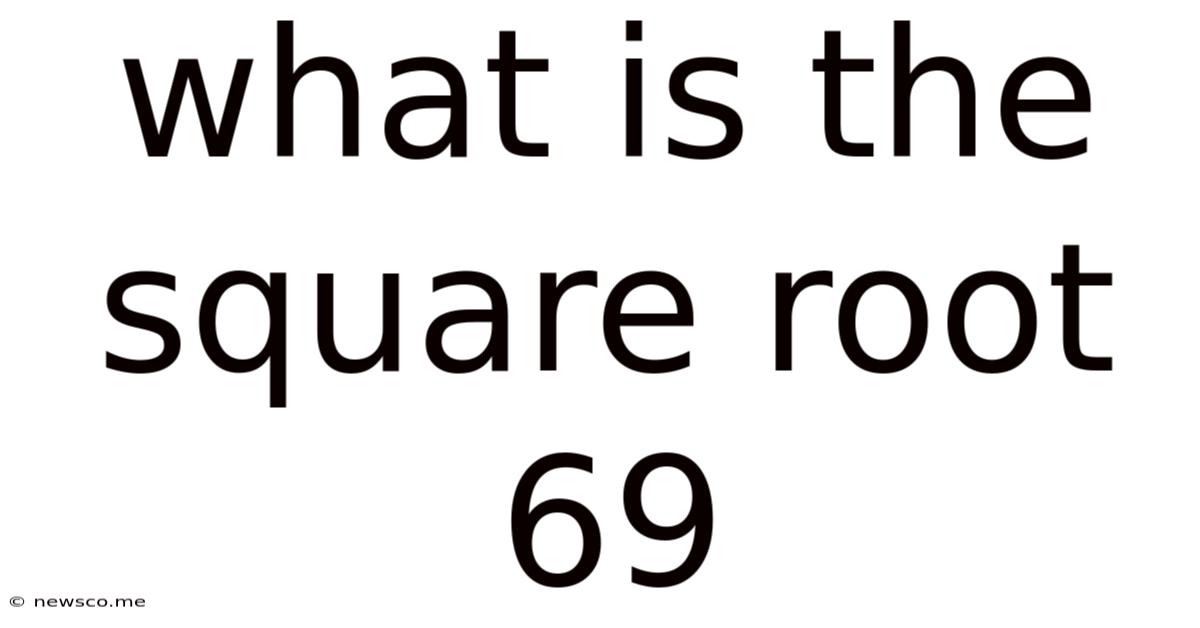What Is The Square Root 69
News Co
Mar 24, 2025 · 5 min read

Table of Contents
What is the Square Root of 69? A Deep Dive into Square Roots and Numerical Approximation
The question, "What is the square root of 69?" might seem simple at first glance. However, it opens the door to exploring fundamental mathematical concepts, practical application methods, and the fascinating world of numerical approximation. This article delves into the intricacies of square roots, providing various ways to find the square root of 69, explaining the underlying principles, and showcasing the power of different approximation techniques.
Understanding Square Roots
Before we tackle the square root of 69 specifically, let's establish a solid foundation. The square root of a number is a value that, when multiplied by itself, equals the original number. In mathematical notation, the square root of 'x' is represented as √x or x<sup>1/2</sup>. For example, the square root of 9 (√9) is 3 because 3 * 3 = 9.
Square roots can be categorized into two types:
- Perfect Squares: These are numbers that have exact integer square roots. Examples include 4 (√4 = 2), 16 (√16 = 4), and 25 (√25 = 5).
- Non-Perfect Squares: These are numbers whose square roots are irrational numbers – numbers that cannot be expressed as a simple fraction and have an infinite, non-repeating decimal representation. 69 falls into this category.
Methods for Finding the Square Root of 69
Since 69 isn't a perfect square, we need to employ different methods to approximate its square root. Here are several approaches, ranging from simple estimation to more sophisticated techniques:
1. Estimation and Guessing
A basic, yet surprisingly effective, method is to start with educated guesses. We know that √64 = 8 and √81 = 9. Since 69 lies between 64 and 81, its square root must be between 8 and 9. A reasonable initial guess could be 8.3. Squaring 8.3 (8.3 * 8.3 = 68.89) shows we are very close. Further refinement through iterative guessing can improve accuracy.
2. The Babylonian Method (or Heron's Method)
This iterative method provides a more efficient way to refine our approximation. The formula is:
x<sub>n+1</sub> = ½ * (x<sub>n</sub> + (N / x<sub>n</sub>))
Where:
- x<sub>n</sub> is the current approximation
- x<sub>n+1</sub> is the next, improved approximation
- N is the number whose square root we seek (69 in our case)
Let's use an initial guess of 8.3:
- Iteration 1: x<sub>1</sub> = ½ * (8.3 + (69 / 8.3)) ≈ 8.3066
- Iteration 2: x<sub>2</sub> = ½ * (8.3066 + (69 / 8.3066)) ≈ 8.30662386
Notice how quickly the approximation converges. Each iteration brings us closer to the actual value. Repeating this process several times yields a highly accurate approximation.
3. Using a Calculator or Computer
The simplest and most accurate method is to use a calculator or computer. These devices are programmed with algorithms capable of computing square roots to many decimal places. Entering √69 into a calculator will yield a result very close to 8.306623862918.
4. Long Division Method
While less frequently used now due to the availability of calculators, the long division method for finding square roots provides a good understanding of the underlying process. This method involves systematically breaking down the number into groups of digits and iteratively refining the approximation. While detailed explanation is beyond the scope of this section, numerous online resources demonstrate this method visually.
The Significance of Irrational Numbers and Decimal Approximations
The square root of 69, like many square roots of non-perfect squares, is an irrational number. This means its decimal representation is non-terminating and non-repeating – it goes on forever without any discernible pattern. This characteristic highlights the limitations of representing such numbers precisely. The approximations we calculate are simply close estimations to a value that cannot be perfectly expressed in decimal form.
Practical Applications of Square Roots
Square roots aren't just abstract mathematical concepts; they have numerous real-world applications across diverse fields:
- Physics: Calculating velocities, distances, and accelerations frequently involves square roots. For example, the Pythagorean theorem (a² + b² = c²) uses square roots to find the hypotenuse of a right-angled triangle.
- Engineering: Structural engineers use square roots in calculations related to stress, strain, and stability.
- Finance: Compound interest calculations employ square roots to determine the time required to reach a specific investment goal.
- Computer Graphics: Square roots are fundamental to many computer graphics algorithms, especially those related to transformations and 3D rendering.
- Statistics: Standard deviation calculations rely heavily on square roots.
Beyond the Square Root of 69: Exploring Higher Roots
While we've focused on the square root of 69, the concept of roots extends beyond square roots. We can have cube roots (∛x), fourth roots (⁴√x), and so on. The 'n'th root of a number x is a value that, when multiplied by itself 'n' times, equals x.
Conclusion: Embracing the Power of Approximation
The square root of 69, though seemingly a straightforward question, reveals the richness and complexity of mathematical concepts. The methods explored here – estimation, the Babylonian method, calculators, and the long division method – showcase different approaches to numerical approximation. Understanding these techniques provides valuable insights into the nature of irrational numbers and their significance in various fields, underscoring the practical power of mathematical tools in solving real-world problems. The seemingly simple question of "What is the square root of 69?" opens up a world of exploration into the fascinating realm of mathematics and its applications.
Latest Posts
Related Post
Thank you for visiting our website which covers about What Is The Square Root 69 . We hope the information provided has been useful to you. Feel free to contact us if you have any questions or need further assistance. See you next time and don't miss to bookmark.